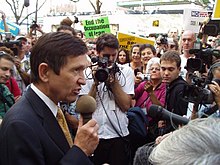Dennis Kucinich 2004 presidential campaign
| Dennis Kucinich 2004 presidential campaign | |
|---|---|
Mayor of Cleveland (1977–1979) | |
| Affiliation | Democratic Party |
| EC formed | February 19, 2003 |
| Announced | October 13, 2003 |
| Suspended | July 22, 2004 |
| Website | |
| http://www.kucinich.us/ | |


The 2004 presidential campaign of
Press coverage
Kucinich was criticized early in his 2004 campaign for changing his stance on the issue of abortion.[1] His explanation was "I've always worked to make abortions less necessary, through sex education and birth control. But the direction that Congress has taken, increasingly, is to make it impossible for women to be able to have an abortion if they need to protect their health. So when I saw the direction taken, it finally came to the point where I understood that women will not be truly free unless they have the right to choose."[2]
On December 10, 2003, the American Broadcasting Company (ABC) announced the removal of its correspondents from the campaigns of Kucinich, Carol Moseley Braun and Al Sharpton.[3]
The announcement came one day after a Democratic presidential debate hosted by ABC News' Ted Koppel, in which Koppel asked whether the candidacies of Kucinich, Moseley Braun and Sharpton were merely "vanity campaigns," and Koppel and Kucinich exchanged uncomfortable dialogue.[4]
Kucinich, previously critical of the limited coverage given his campaign, characterized ABC's decision as an example of media companies' power to shape campaigns by choosing which candidates to cover and questioned its timing, coming immediately after the debate.[3]
ABC News, while stating its commitment to give coverage to a wide range of candidates, argued that focusing more of its "finite resources" on those candidates most likely to win would best serve the public debate.[4]
Polls and primaries
In the
He placed second in
In the
On Super Tuesday, March 2, Kucinich gained another strong showing with the Minnesota caucus, where 17 percent of the ballots went to him. In his home state of Ohio, he gained nine percent in the primary.
Kucinich campaigned heavily in
Even after Kerry won enough delegates to secure the nomination, Kucinich continued to campaign up until just before the convention, citing an effort to help shape the agenda of the Democratic Party. He was the last candidate to end his campaign. He endorsed Kerry on July 22, four days before the start of the Democratic National Convention.[8]
Endorsements
References
- ^ Marc Sandalow, "Ohio Presidential Hopeful Pivots Over to Pro-Choice Camp Archived 2013-09-02 at the Wayback Machine", San Francisco Chronicle, February 23, 2003.
- ^ Democratic 2004 Primary Presidential Debate in Durham, New Hampshire, December 9, 2003.
- ^ a b "Kucinich & Braun Blast ABC For Reducing Campaign Coverage." Archived 2007-11-18 at the Wayback Machine Democracy Now! December 12, 2003. Accessed July 24, 2007.
- ^ a b Robinson, Josh and Lorna Tychostup. "How the Media Picks the Candidates." Archived January 3, 2007, at the Wayback Machine February 2004. Z Magazine. July 24, 2007.
- ISSN 0027-8378. Retrieved 2023-04-08.
- ^ Rick Lyman, "Down But Not Out, Kucinich Keeps Fighting Archived 2013-09-02 at the Wayback Machine", The New York Times, May 17, 2004.
- ^ "Kerry visits spotlights Oregon's state primary." Archived January 3, 2009, at the Wayback Machine May 18, 2004. kgw news. Accessed July 25, 2007.
- ^ David Halbfinger, "The 2004 Campaign: Campaign Briefing -- The Democrats; Kucinich Endorses Kerry", The New York Times, July 23, 2004.

